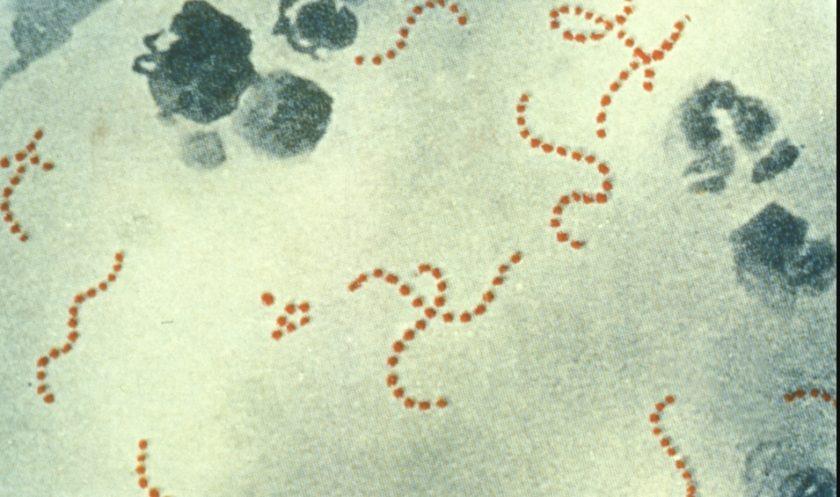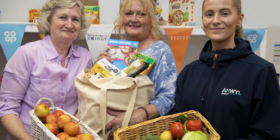UK Health Security Agency says parents should be on lookout for Strep A symptoms

A lack of mixing in children during the pandemic may have caused a drop in population-wide immunity to infections such as Strep A, a leading microbiologist has said.
Six children have died after contracting Strep A, they include a child in Penarth, Vale of Glamorgan and five under 10-year-olds in England.
The latest data from the UK Health Security Agency (UKHSA) shows that scarlet fever cases continue to remain higher than we would typically see at this time of year.
Scarlet fever is caused by bacteria called group A streptococci. These bacteria also cause other respiratory and skin infections such as strep throat and impetigo.
There were 851 cases reported in week 46, compared to an average of 186 for the preceding years.
Scarlet fever is usually a mild illness, but it is highly infectious.
The UKHSA said in the “very rare occasions, the bacteria can get into the bloodstream and cause an illness called invasive Group A strep (iGAS). ”
“While still uncommon, there has been an increase in invasive Group A strep cases this year, particularly in children under 10.”
“There were 2.3 cases per 100,000 children aged 1 to 4 compared to an average of 0.5 in the pre-pandemic seasons (2017 to 2019) and 1.1 cases per 100,000 children aged 5 to 9 compared to the pre-pandemic average of 0.3 (2017 to 2019) at the same time of the year.”
UKHSA said investigations are also underway following reports of an increase in lower respiratory tract Group A strep infections in children over the past few weeks, which have caused severe illness.
“Currently, there is no evidence that a new strain is circulating. The increase is most likely related to high amounts of circulating bacteria and social mixing.”
Dr Colin Brown, Deputy Director, UKHSA, said: “We are seeing a higher number of cases of Group A strep this year than usual.”
“The bacteria usually causes a mild infection producing sore throats or scarlet fever that can be easily treated with antibiotics.”
“In very rare circumstances, this bacteria can get into the bloodstream and cause serious illness – called invasive Group A strep (iGAS).”
“This is still uncommon; however, it is important that parents are on the lookout for symptoms and see a doctor as quickly as possible so that their child can be treated and we can stop the infection becoming serious.”
“Make sure you talk to a health professional if your child is showing signs of deteriorating after a bout of scarlet fever, a sore throat, or a respiratory infection.”
Dr Simon Clarke, microbiologist at the University of Reading, said:
“It’s important to remember that infections like this never occur at a constant rate, you get peaks and troughs in numbers and from that we work out an average.”
“There is a suggestion that there have been more cases lately than we would expect, but that might be a statistical blip; publication of diagnosed infection numbers is slow and infrequent compared to the sort of data that was released during the pandemic.”
“Similarly, I’ve seen no data to indicate that a new strain is responsible for the current cases. ”
“It’s also important to stress that this infection, when diagnosed quickly, can easily be treated with antibiotics, and only in extreme cases does it need hospitalisation.”
Dr Clarke said: “I’m unaware of any factor linking these reported deaths, so it’s impossible to link them, but I do expect there to be further cases over the coming weeks and months.”
“It strikes me that as we are seeing with flu at the moment, lack of mixing in kids may have caused a drop in population wide immunity that could increase transmission, particularly in school age children.”
UKHSA has issued the following advice…
There are lots of viruses that cause sore throats, colds and coughs circulating.
These should resolve without medical intervention. However, children can on occasion develop a bacterial infection on top of a virus and that can make them more unwell.
Therefore, look out for symptoms in your child, which include a sore throat, headache, and fever, along with a fine, pinkish or red body rash with a sandpapery feel.
On darker skin, the rash can be more difficult to detect visually but will have a sandpapery feel.
Contact NHS 111 or your GP if you suspect your child has scarlet fever, because early treatment of scarlet fever with antibiotics is important to reduce the risk of complications such as pneumonia or a bloodstream infection.
If your child has scarlet fever, keep them at home until at least 24 hours after the start of antibiotic treatment to avoid spreading the infection to others.
As a parent, if you feel that your child seems seriously unwell, you should trust your own judgement.
Contact NHS 111 or your GP if:
- your child is getting worse
- your child is feeding or eating much less than normal
- your child has had a dry nappy for 12 hours or more or shows other signs of dehydration
- your baby is under 3 months and has a temperature of 38°C, or is older than 3 months and has a temperature of 39°C or higher
- your baby feels hotter than usual when you touch their back or chest, or feels sweaty
- your child is very tired or irritable
Call 999 or go to A&E if:
- your child is having difficulty breathing – you may notice grunting noises or their tummy sucking under their ribs
- there are pauses when your child breathes
- your child’s skin, tongue or lips are blue
- your child is floppy and will not wake up or stay awake
Good hand and respiratory hygiene are important for stopping the spread of many bugs. By teaching your child how to wash their hands properly with soap for 20 seconds, using a tissue to catch coughs and sneezes, and keeping away from others when feeling unwell, they will be able to reduce the risk of picking up or spreading infections.
Spotted something? Got a story? Send a Facebook Message | A direct message on Twitter | Email: [email protected]Latest News









